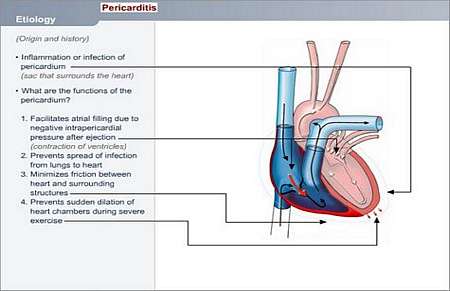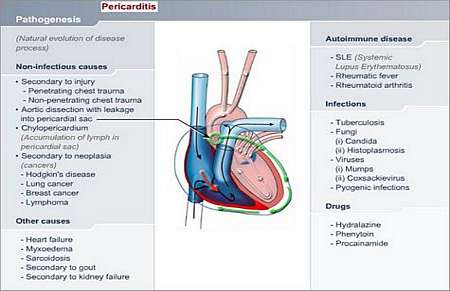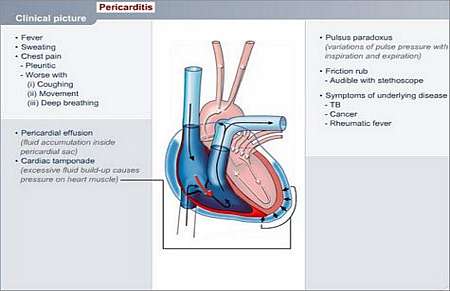What is PERICARDITIS (Infection of the heart sac)?
The pericardium is the sac that surrounds the heart. Inflammation or infection of the pericardium is called pericarditis.
Why does this happen and how may it affect the patient’s health?
There are many conditions and illnesses that may cause pericarditis, e.g.
- It may be a result of injury (trauma) because of direct injury (stab wound in the chest), a heart operation, or radiation therapy
- Conditions such as heart failure, an underactive thyroid, or sarcoidosis
- Cancerous growths may directly infiltrate the pericardium
- Diseases such as SLE and rheumatic fever
- Diseases secondary to gout, chronic renal failure as a consequence of chronic dialysis treatment, or complications of a heart attack
Tuberculosis is known for causing a constrictive pericarditis. The infection inhibits normal contraction of the heart. It almost smothers the heart due to outside pressure.


What symptoms may the patient experience?
The patient may present with fever (not always present), sweating and pain in the chest.
There may be an effusion (abnormal fluid accumulation) in the pericardial sac, causing pressure symptoms on the heart (tamponade).
Pain is aggravated by coughing, movement, or when taking deep breaths.
When the doctor listens to the heart sounds, there may be abnormal sounds like a friction type noise (friction rub).
The patient will most probably also present with symptoms of the underlying disease that caused the pericarditis, such as
- Cancer
- Tuberculosis
- Rheumatic fever

How is the diagnosis made and what special investigations are required?
- ECG (electrocardiogram)
- Examination of fluid in the pericardial sac after aspirating it with a needle and syringe
- An ultrasound (sonar) is valuable and may demonstrate accumulation of fluid in the pericardial sac, as well as thickening of the pericardium due to inflammation
- A biopsy (tissue sample for microscopic analysis) of the pericardium may shed light on the cause of the condition
What is the treatment and prognosis?
It is most important to identify and treat the underlying condition that caused the pericarditis in the first place.
- Non-steroidal anti-inflammatory drugs (NSAIDS)
- Corticosteroids may be given to patients who do not respond to NSAIDS or for specific conditions such as SLE (systemic lupus erythematosus).
- It may be necessary to tap (remove) fluid accumulating in the pericardial sac, surrounding the heart, in order to prevent pressure from the fluid build-up to compress the heart and compromise (inhibit) the heart muscle from contracting and dilating.
- The prognosis depends on the underlying causative condition and the extent to which the cause can be treated successfully, and prevention of further damage to heart tissues.
© 2003 Prometheus™ Healthcare (Pty) Ltd
|